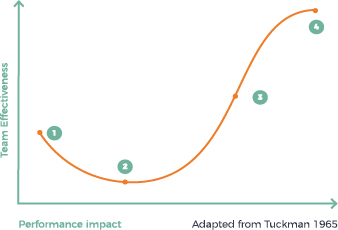The action team will change too

“Change will not come if we wait for some other person at some other time. We are the ones we’ve been waiting for. We are the change that we seek.”
—Barack Obama
Change is not something that just happens to others. Your Action Team will change as the project evolves and interpersonal dynamics play out. There will be cycles of highs and lows, feelings of unlimited elation and feelings of deep depression. This is normal. In fact, the power of a team is that there is generally someone who is more optimistic at a low point or someone with a cautionary note at a time of heady elation.
Expect these stages:

| 1 |
Forming |
| 2 |
Storming |
| 3 |
Norming |
| 4 |
Performing |
So, just as the Confusion Room is one of the Four Rooms of Change, the Storming stage of team development can be normal. Tips to get the best from the team in these stages are:
- Forming: set a common Vision, agree on ways to work together and get everyone’s input.
- Storming: get to know each other’s strengths and personal styles.
- Norming: create the plans for action.
- Performing: delegate and move forward effectively.
Note: Ensure time and resources are put aside for internal reflection, negotiation and discussion. Internal conflicts and disagreements can fester and disrupt the outcomes of the group if everyone was too focused on “getting things done” and undervalued the importance of examining internal relationships. It is important that you present a united front to the world.
Actions
It might be a good idea for all the Action Team to do the DiSC profile, which is a simple way of seeing each others’ preferred way of working and to learn how to work best with each other. See some more on this free tool in Dive Deeper.